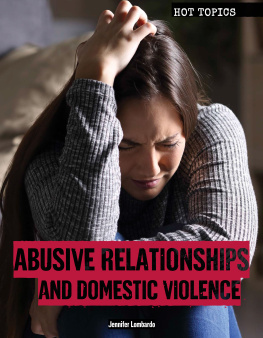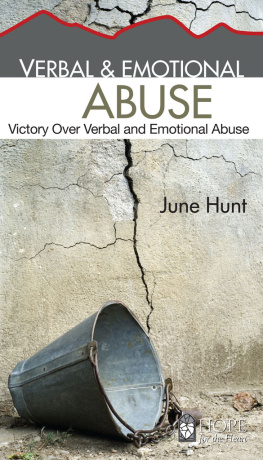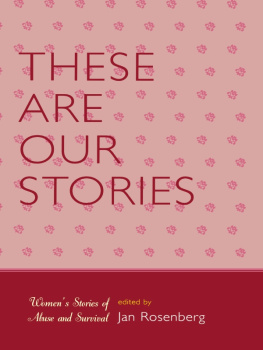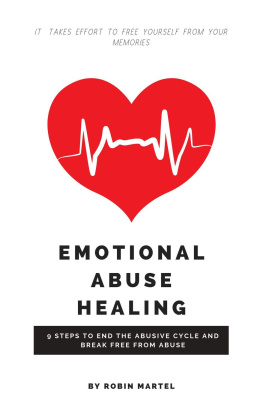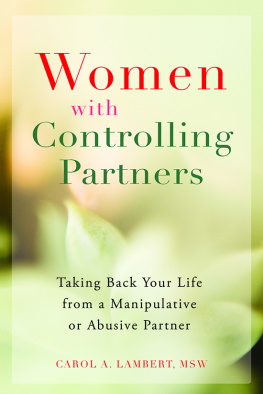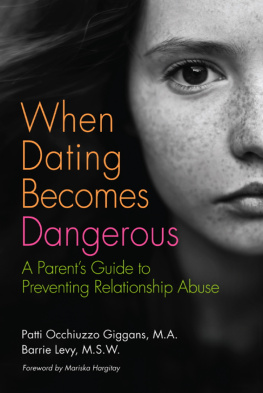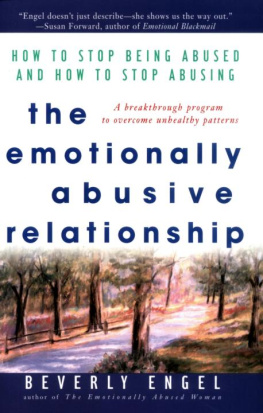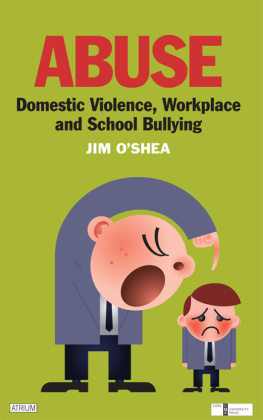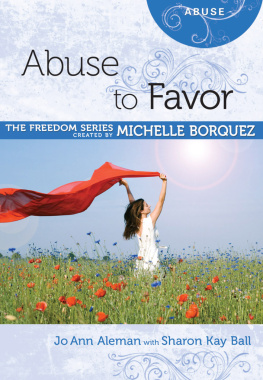Unclenching Our Fists
Unclenching Our Fists
Abusive Men on the Journey to Nonviolence
Sara Elinoff Acker
Photography by Peter Acker
Vanderbilt University Press
NASHVILLE
2013 by Vanderbilt University Press
Nashville, Tennessee 37235
All rights reserved
First printing 2013
This book is printed on acid-free paper.
Manufactured in the United States of America
Library of Congress Cataloging-in-Publication Data on file
LC control number 2013002806
LC classification HV1441.8.U5E45 2013
Dewey class number 362.82'9286dc23
ISBN 978-0-8265-1941-2 (cloth)
ISBN 978-0-8265-1942-9 (paperback)
ISBN 978-0-8265-1943-6 (ebook)
In memory of my father, Saul Elinoff,
who showed me from the start
what a safe and loving man can be....
Contents
Unclenching Our Fists
Introduction
We clench our fists in a moments notice, but unclenching them is another matter.
Anna Politkovskaya, the Russian journalist who reported on the Chechnya war and was shot to death outside her Moscow apartment in 2006.
FOR MY COLLEAGUES AND me in western Massachusetts, the late 1980s through the mid-1990s was a devastating time to work with families affected by domestic violence. There had been an unprecedented string of domestic violence murders: over the course of eight years, ten women and one child had been killed. One was particularly horrific. Sherry Morton and her eighteen-month-old son, Cedric, were stabbed to death by Sherrys ex-boyfriend, the babys father. The entire community was traumatized.
In the wake of these murders, the community became determined to create a more coordinated and collaborative system to try to reduce the risk of lethal violence. Spearheaded by the District Attorneys office, key players in the communitypolice officers and dispatchers, prosecutors and probation officers, advocates and batterer intervention counselorscollaborated to create a more seamless response to families affected by domestic violence. One of the people at the table was Yoko Kato, the mother and grandmother of Sherry and Cedric. A local dressmaker who decades earlier had come to the United States from her native Japan, Yoko forged her grief over their murders into a commitment to work as a domestic violence activist.
Yoko knew that helping survivors wasnt enough. She realized that no matter how many victims were helped, the source of the problem was the men who were abusive and violent. She yearned to understand how to stop mens violence. This is what brought her to Men Overcoming Violence, the batterer intervention program where I worked, part of the Mens Resource Center for Change in Amherst, Massachusetts. Yoko joined our board of directors.
It was Yokos idea to dialogue directly with some of the men enrolled in our program. She wanted the opportunity to ask domestic violence perpetrators some difficult questions. Why did they feel justified hurting their partners? What excuses did they make for their behaviors? How did they learn to be violent? What got them to wake up and face themselves? She also wanted to share her story, the story of Sherry and Cedric and her work as an activist. We arranged a meeting one November afternoon in 1997 with Yoko, five members of our group program, several of our counselors and our program director.
It had been four years since Sherry and Cedric had been killed. My colleagues and I were nervous. We had never seen anything like this before: a survivor and perpetrators sitting in a room together, speaking directly to one another. I had worked in battered womens programs for more than a decade before becoming the partner support counselor at Men Overcoming Violence. In all my years doing domestic violence work, there was always a firewall between domestic violence victims and perpetrators. Unless they were in a courtroom, survivors and perpetrators were never intentionally brought into the same space.
Healing, possibility, and hope can show up in the most unlikely of places. The meeting that day was one of those places. Our small meeting room was crowded, buzzing with tension. At Yokos invitation and with the permission of the participants, the entire dialogue was being filmed by a Japanese television crew. In addition to her work as a local activist, Yoko was taking domestic violence prevention work back to Japan, where the issue was an enormous problem with scant awareness or resources to address it. The footage from the meeting was going to be part of an expose on domestic violence, offering the first glimpse many Japanese citizens would have of domestic abuse perpetrators talking about their violence.
The men who participated in the meeting that day had been invited to attend by program staff because they had shown promise. Each had acknowledged responsibility for his violence and had been attending our program for at least two years. Each also agreed to share his story with Yoko.
Because there was no place left to sit, I stood in the doorway. While Yoko shared her story, the men listened attentively. Her voice broke when she described her daughter and grandson, what they were like while they were alive, and her relationship with them. She spoke of Sherrys abusive relationship, her struggle to break away, and the trauma of their violent deaths. She talked about her feelings about the perpetrator, sitting in jail after being found guilty of their murders. Finally, she spoke about her mission to end the violence that took the lives of her daughter and grandson. The room was so still I could hear my own breathing.
One by one, the men began to tell their stories. They talked about the abuse they had perpetrated against their partners and the damage their behavior had caused. They talked about getting arrested or being served restraining orders and what it had taken to finally get them to take responsibility for what they had done. They talked about the work they were doing in our program. Each voiced his regrets; some choked back tears. They seemed to sense how deeply Yoko was listening, sharing with her both their deep remorse and the pride they felt about their small successes. They shared with her the wounds they were working to heal and, most significantly, the different men they were becoming. Yoko challenged the men to continue their work and to reach out to other men who had violence and abuse problems.
Yoko told me later that the meeting was an important turning point in her own healing process. Though the man who murdered Sherry and Cedric was in prison, he continued to be unremorseful. By contrast, the men who shared their stories had taken responsibility for their violence. This was important for her to witness. I wanted to see if some of these menif they got the right intervention and supportcould really end their violence, she told me. Its too late for Sherry and Cedric, but the work you are doing might help save someone elses children and grandchildren.
When I first started working in the field of domestic violence, I didnt believe abusive men could really change. Now I know that some can. Sadly, men whove committed to change are only a small minority of men who are abusive. Too many abusive men continue to live unrepentant lives, unaccountable, still a danger to their families. The men whose stories you will read are part of a select group chosen by batterer intervention program leaders from around the country as representatives of the best possible outcome: men who have faced themselves and stopped their abusive behaviors. Many of them did not choose to enroll in their programs, but ultimately each did choose to become nonviolent. It is my hope that their stories will inspire others to make the same choice.
Next page

